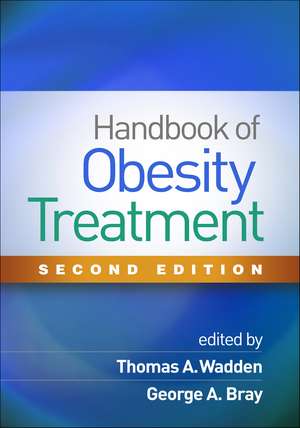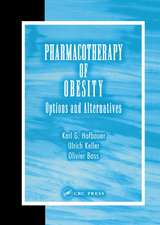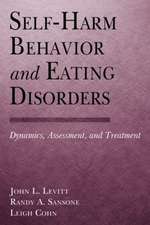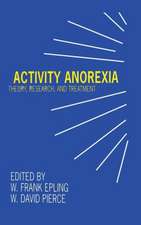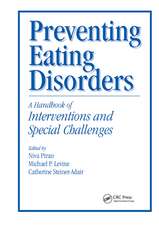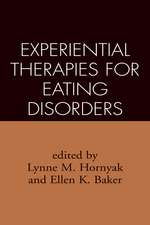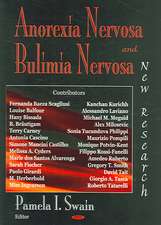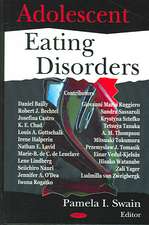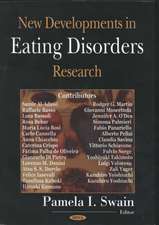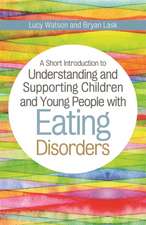Handbook of Obesity Treatment, Second Edition
Editat de Thomas A. Wadden, George A. Brayen Limba Engleză Paperback – 4 dec 2019
The leading clinical reference work in the field--now significantly revised with 85% new material--this handbook gives practitioners and students a comprehensive understanding of the causes, consequences, and management of adult and childhood obesity. In concise, extensively referenced chapters from preeminent authorities, the Handbook presents foundational knowledge and reviews evidence-based psychosocial and lifestyle interventions as well as pharmacological and surgical treatments. It provides guidelines for conducting psychosocial and medical assessments and for developing individualized treatment plans. The effects of obesity--and of weight loss--on physical and psychological well-being are reviewed, as are strategies for helping patients maintain their weight loss.
New to This Edition
*Many new authors and topics; extensively revised and expanded with over 15 years of research and clinical advances, including breakthroughs in understanding the biological regulation of appetite and body weight.
*Section on contributors to obesity, with new chapters on food choices, physical activity, sleep, and psychosocial and environmental factors.
*Chapters on novel treatments for adults--acceptance and commitment therapy, motivational interviewing, digitally based interventions, behavioral economics, community-based programs, and nonsurgical devices.
*Chapters on novel treatments for children and adolescents--school-based preventive interventions, family-based behavioral weight loss treatment, and bariatric surgery.
*Chapters on the gut microbiome, the emerging field of obesity medicine, reimbursement for weight loss therapies, and managing co-occurring eating disorders and obesity.
New to This Edition
*Many new authors and topics; extensively revised and expanded with over 15 years of research and clinical advances, including breakthroughs in understanding the biological regulation of appetite and body weight.
*Section on contributors to obesity, with new chapters on food choices, physical activity, sleep, and psychosocial and environmental factors.
*Chapters on novel treatments for adults--acceptance and commitment therapy, motivational interviewing, digitally based interventions, behavioral economics, community-based programs, and nonsurgical devices.
*Chapters on novel treatments for children and adolescents--school-based preventive interventions, family-based behavioral weight loss treatment, and bariatric surgery.
*Chapters on the gut microbiome, the emerging field of obesity medicine, reimbursement for weight loss therapies, and managing co-occurring eating disorders and obesity.
Preț: 396.66 lei
Preț vechi: 417.53 lei
-5% Nou
Puncte Express: 595
Preț estimativ în valută:
75.91€ • 78.80$ • 63.30£
75.91€ • 78.80$ • 63.30£
Carte disponibilă
Livrare economică 01-15 martie
Livrare express 15-21 februarie pentru 59.71 lei
Preluare comenzi: 021 569.72.76
Specificații
ISBN-13: 9781462542901
ISBN-10: 1462542905
Pagini: 716
Dimensiuni: 178 x 254 x 33 mm
Greutate: 1.23 kg
Ediția:2 ed
Editura: Guilford Publications
Colecția Guilford Press
ISBN-10: 1462542905
Pagini: 716
Dimensiuni: 178 x 254 x 33 mm
Greutate: 1.23 kg
Ediția:2 ed
Editura: Guilford Publications
Colecția Guilford Press
Public țintă
Professional Practice & DevelopmentCuprins
I. Prevalence, Consequences, and Etiology of Obesity
1. Epidemiology and Health and Economic Consequences of Obesity, Graham A. Colditz & Hank Dart
2. Gut-to-Brain Mechanisms of Body Weight Regulation, Matthew R. Hayes
3. Energy Expenditure and Obesity, Kara L. Marlatt & Eric Ravussin
4. Genetics of Obesity, I. Sadaf Farooqi
5. Human Energy Homeostasis and the Gut Microbiome, Michael Rosenbaum & Rudolph L. Leibel
II. Behavioral, Environmental, and Psychosocial Contributors to Obesity
6. The Role of Portion Size, Energy Density, and Variety in Obesity and Weight Management, Barbara J. Rolls
7. Physical Activity and the Development of Obesity, Claude Bouchard, Peter T. Katzmarzyk, & Robert Ross
8. Sleep and Obesity, Andrea M. Spaeth & David F. Dinges
9. Social, Economic, and Physical Environmental Contributors to Obesity among Adults, Joreintje Dingena Mackenbach, Jeroen Lakerveld, & Johannes Brug
10. Psychosocial Contributors to and Consequences of Obesity, Rebecca M. Puhl & Rebecca L. Pearl
11. Obesity, Eating Disorders, and Addiction, Courtney McCuen-Wurst & Kelly C. Allison
III. Health Consequences of Weight Reduction
12. The Impact of Intentional Weight Loss on Major Morbidity and Mortality, Edward W. Gregg & Marcela Rodriguez Flores
13. Weight Loss and Changes in Psychosocial Status and Cognitive Function, Candice A. Myers & Corby K. Martin
14. Effects of Lifestyle Interventions on Health-Related Quality of Life and Physical Functioning, W. Jack Rejeski & Donald A. Williamson
IV. Assessment of Patients with Obesity
15. Medical Evaluation of Patients with Obesity, Rekha B. Kumar & Louis J. Aronne
16. Behavioral Assessment of Patients with Obesity, Jena A. Shaw Tronieri & Thomas A. Wadden
V. Treatment of Obesity in Adults
17. An Overview of the Treatment of Obesity in Adults, Thomas A. Wadden, Zayna M. Bakizada, Steven Z. Wadden, & Naji Alamuddin
18. Dietary Treatment of Overweight and Obesity, Arne S. Astrup
19. Physical Activity and Weight Management, John M. Jakicic, Renee J. Rogers, Sally A. Sherman, & Sara J. Kovacs
20. Behavioral Treatment of Obesity, Stephanie Gomez-Rubalcava, Kaitlin Stabbert, & Suzanne Phelan
21. The Role of Medications in Weight Management, George A. Bray & Donna H. Ryan
22. Surgical Treatment of Obesity, Zubaidah Nor Hanipah, Ali Aminian, & Philip R. Schauer
23. Maintenance of Weight Lost in Behavioral Treatment of Obesity, Michael G. Perri & Aviva H. Ariel-Donges
VI. Additional Approaches to and Resources for the Treatment of Obesity
24. The Emerging Field of Obesity Medicine, Robert F. Kushner & Scott Kahan
25. Coverage of Obesity Treatment: Costs and Benefits, Morgan Downey & Theodore K. Kyle
26. Obesity Treatment Perspectives in U.S. Racial/Ethnic Minority Populations, Shiriki K. Kumanyika
27. Treatment of Obesity in Primary Care, Adam G. Tsai & Thomas A. Wadden
28. Remotely Delivered Interventions for Obesity, Deborah F. Tate, Brooke T. Nezami, & Carmina G. Valle
29. Commercial Weight-Loss Programs, Kimberly A. Gudzune & Jeanne M. Clark
30. Treatment of Obesity in Community Setting, Delia Smith West, Rebecca A. Krukowski, & Chelsea A. Larsen
31. Alternative Behavioral Weight Loss Approaches: Acceptance and Commitment Therapy and Motivational Interviewing, Meghan L. Butryn, Leah M. Schumacher, & Evan M. Forman
32. Behavioral Economics and Weight Management, Mitesh S. Patel & Kevin G. M. Volpp
33. Nonsurgical Interventional Modalities for the Treatment of Obesity, Jacqueline M. Soegaard Ballester, Casey H. Halpern, Noel N. Williams, & Kristoffel R. Dumon
34. Treatment of Eating Disorders in Persons with Obesity, Carlos M. Grilo
35. Obesity and Body Image Dissatisfaction, David B. Sarwer, Colleen M. Tewksbury, & Heather M. Polonsky
36. Obesity, Weight Management, and Self-Esteem, Carol Johnson
VII. Childhood Obesity and Obesity Prevention
37. The Development of Childhood Obesity, Tanja V. E. Kral & Robert I. Berkowitz
38. Prevention of Obesity in Youth: Findings from Controlled Trials, Hannah G. Lawman, Alexis C. Wojtanowski, & Gary D. Foster
39. Behavioral Treatment of Obesity in Youth, Katherine N. Balantekin, Denise E. Wilfley, & Leonard H. Epstein
40. Pharmacological Treatment of Pediatric Obesity, Robert I. Berkowitz & Ariana M. Chao
41. Bariatric Surgery in Adolescents with Severe Obesity, Andrew J. Beamish & Thomas H. Inge
42. Using Public Policy to Address Obesity: Past, Present, and Future, Marlene B. Schwartz & Kelly D. Brownell
Author Index
Subject Index
1. Epidemiology and Health and Economic Consequences of Obesity, Graham A. Colditz & Hank Dart
2. Gut-to-Brain Mechanisms of Body Weight Regulation, Matthew R. Hayes
3. Energy Expenditure and Obesity, Kara L. Marlatt & Eric Ravussin
4. Genetics of Obesity, I. Sadaf Farooqi
5. Human Energy Homeostasis and the Gut Microbiome, Michael Rosenbaum & Rudolph L. Leibel
II. Behavioral, Environmental, and Psychosocial Contributors to Obesity
6. The Role of Portion Size, Energy Density, and Variety in Obesity and Weight Management, Barbara J. Rolls
7. Physical Activity and the Development of Obesity, Claude Bouchard, Peter T. Katzmarzyk, & Robert Ross
8. Sleep and Obesity, Andrea M. Spaeth & David F. Dinges
9. Social, Economic, and Physical Environmental Contributors to Obesity among Adults, Joreintje Dingena Mackenbach, Jeroen Lakerveld, & Johannes Brug
10. Psychosocial Contributors to and Consequences of Obesity, Rebecca M. Puhl & Rebecca L. Pearl
11. Obesity, Eating Disorders, and Addiction, Courtney McCuen-Wurst & Kelly C. Allison
III. Health Consequences of Weight Reduction
12. The Impact of Intentional Weight Loss on Major Morbidity and Mortality, Edward W. Gregg & Marcela Rodriguez Flores
13. Weight Loss and Changes in Psychosocial Status and Cognitive Function, Candice A. Myers & Corby K. Martin
14. Effects of Lifestyle Interventions on Health-Related Quality of Life and Physical Functioning, W. Jack Rejeski & Donald A. Williamson
IV. Assessment of Patients with Obesity
15. Medical Evaluation of Patients with Obesity, Rekha B. Kumar & Louis J. Aronne
16. Behavioral Assessment of Patients with Obesity, Jena A. Shaw Tronieri & Thomas A. Wadden
V. Treatment of Obesity in Adults
17. An Overview of the Treatment of Obesity in Adults, Thomas A. Wadden, Zayna M. Bakizada, Steven Z. Wadden, & Naji Alamuddin
18. Dietary Treatment of Overweight and Obesity, Arne S. Astrup
19. Physical Activity and Weight Management, John M. Jakicic, Renee J. Rogers, Sally A. Sherman, & Sara J. Kovacs
20. Behavioral Treatment of Obesity, Stephanie Gomez-Rubalcava, Kaitlin Stabbert, & Suzanne Phelan
21. The Role of Medications in Weight Management, George A. Bray & Donna H. Ryan
22. Surgical Treatment of Obesity, Zubaidah Nor Hanipah, Ali Aminian, & Philip R. Schauer
23. Maintenance of Weight Lost in Behavioral Treatment of Obesity, Michael G. Perri & Aviva H. Ariel-Donges
VI. Additional Approaches to and Resources for the Treatment of Obesity
24. The Emerging Field of Obesity Medicine, Robert F. Kushner & Scott Kahan
25. Coverage of Obesity Treatment: Costs and Benefits, Morgan Downey & Theodore K. Kyle
26. Obesity Treatment Perspectives in U.S. Racial/Ethnic Minority Populations, Shiriki K. Kumanyika
27. Treatment of Obesity in Primary Care, Adam G. Tsai & Thomas A. Wadden
28. Remotely Delivered Interventions for Obesity, Deborah F. Tate, Brooke T. Nezami, & Carmina G. Valle
29. Commercial Weight-Loss Programs, Kimberly A. Gudzune & Jeanne M. Clark
30. Treatment of Obesity in Community Setting, Delia Smith West, Rebecca A. Krukowski, & Chelsea A. Larsen
31. Alternative Behavioral Weight Loss Approaches: Acceptance and Commitment Therapy and Motivational Interviewing, Meghan L. Butryn, Leah M. Schumacher, & Evan M. Forman
32. Behavioral Economics and Weight Management, Mitesh S. Patel & Kevin G. M. Volpp
33. Nonsurgical Interventional Modalities for the Treatment of Obesity, Jacqueline M. Soegaard Ballester, Casey H. Halpern, Noel N. Williams, & Kristoffel R. Dumon
34. Treatment of Eating Disorders in Persons with Obesity, Carlos M. Grilo
35. Obesity and Body Image Dissatisfaction, David B. Sarwer, Colleen M. Tewksbury, & Heather M. Polonsky
36. Obesity, Weight Management, and Self-Esteem, Carol Johnson
VII. Childhood Obesity and Obesity Prevention
37. The Development of Childhood Obesity, Tanja V. E. Kral & Robert I. Berkowitz
38. Prevention of Obesity in Youth: Findings from Controlled Trials, Hannah G. Lawman, Alexis C. Wojtanowski, & Gary D. Foster
39. Behavioral Treatment of Obesity in Youth, Katherine N. Balantekin, Denise E. Wilfley, & Leonard H. Epstein
40. Pharmacological Treatment of Pediatric Obesity, Robert I. Berkowitz & Ariana M. Chao
41. Bariatric Surgery in Adolescents with Severe Obesity, Andrew J. Beamish & Thomas H. Inge
42. Using Public Policy to Address Obesity: Past, Present, and Future, Marlene B. Schwartz & Kelly D. Brownell
Author Index
Subject Index
Notă biografică
Thomas A. Wadden, PhD, is the Albert J. Stunkard Professor of Psychology in Psychiatry at the Perelman School of Medicine, University of Pennsylvania. He also is Visiting Professor of Psychology at Haverford College. Dr. Wadden's more than 500 scientific publications have focused on the treatment of obesity by methods including diet, physical activity, behavior therapy, medication, and surgery. He also has investigated the health and psychosocial consequences of obesity and its associated eating disorders. Dr. Wadden is past president of the Obesity Society and has served on numerous panels for the National Institutes of Health. He is the recipient of numerous honors, including the TOPS Research Achievement Award from the Obesity Society, mentoring awards from the Perelman School of Medicine and the Obesity Society, and the Distinguished Alumni Award from the Department of Psychology at The University of North Carolina at Chapel Hill.
George A. Bray, MD, is Boyd Professor Emeritus at the Pennington Biomedical Research Center, Louisiana State University; Professor of Medicine Emeritus at the Louisiana State University Medical Center; and Visiting Scientist at the Children’s Hospital of Oakland Research Institute. With over 2,000 scientific publications, Dr. Bray has conducted influential research on the causes of obesity, dietary approaches to the prevention of hypertension and diabetes, and dietary approaches to weight loss. He is a Master in the American College of Physicians, the American College of Endocrinology, and the American Board of Obesity Medicine. Other honors include the Lifetime Achievement Award from the North American Association for the Study of Obesity, induction into the Johns Hopkins Society of Scholars, and the Presidential Medal from the Obesity Society.
George A. Bray, MD, is Boyd Professor Emeritus at the Pennington Biomedical Research Center, Louisiana State University; Professor of Medicine Emeritus at the Louisiana State University Medical Center; and Visiting Scientist at the Children’s Hospital of Oakland Research Institute. With over 2,000 scientific publications, Dr. Bray has conducted influential research on the causes of obesity, dietary approaches to the prevention of hypertension and diabetes, and dietary approaches to weight loss. He is a Master in the American College of Physicians, the American College of Endocrinology, and the American Board of Obesity Medicine. Other honors include the Lifetime Achievement Award from the North American Association for the Study of Obesity, induction into the Johns Hopkins Society of Scholars, and the Presidential Medal from the Obesity Society.
Recenzii
"Wadden and Bray have done a remarkable job. Chapter authors provide the 'big picture' on each topic as well as figures and tables that allow interested readers to drill down on the specific information they need. A great deal of recent treatment data is included in chapters that are well designed to help providers interested in providing all treatment options for their patients. The chapter on surgical treatment has some of the best drawings showing the different types of bariatric surgery procedures that I have seen. In addition, I particularly like the new section on behavioral, environmental, and psychosocial contributors to obesity. This is the kind of book you will want to have at hand when any question arises about the causes and treatment of obesity. It will be extremely useful to trainees in obesity medicine; many of the chapters will make excellent reading assignments."--Michael D. Jensen, MD, Thomas J. Watson, Jr. Professor in Honor of Dr. Robert L. Frye, Mayo Clinic College of Medicine
"Since so much has changed in our understanding of obesity and its treatment in adults and children in the past 15 years, this second edition comes at the perfect time. The book provides a comprehensive resource, with many more chapters than the first edition. Each chapter is written by a leading authority in the field and addresses an important issue in the etiology, consequences, and treatment of this disease. This will certainly be the go-to book on obesity for researchers, clinicians, and students."--Rena R. Wing, PhD, Department of Psychiatry and Human Behavior, Brown University Medical School; Director, Weight Control and Diabetes Research Center, The Miriam Hospital
"This second edition offers a comprehensive, up-to-date summary of the state of the art regarding all aspects of obesity, including its prevalence, etiology, environmental and psychosocial contributors, manifestations, consequences, and treatment in a variety of settings. In addition, the volume reviews research relevant to public policy, organization of obesity care, and pediatric and adolescent populations. A definitive reference from recognized authorities."--Bruce M. Wolfe, MD, FACS, FASMBS, Professor of Surgery and Vice Chair of Research, Division of Bariatric Surgery, Oregon Health and Science University
"The editors, pioneers in the field, have recruited the world’s leading experts. The book contains an incredible wealth of knowledge, providing the broadest and most authoritative coverage in the field. It provides new and updated information on diverse topics including epidemiology, etiology, body weight regulation, energy metabolism, genetic influences, the microbiome in obesity, recently approved medications, surgical approaches, and behavioral interventions. The latest in insurance coverage, childhood obesity, and primary prevention is extensively reviewed. This is the indispensable resource for all researchers and clinicians involved in the management of obesity, and will remain the go-to source for years to come. It’s a terrific handbook and really all you need."--John P. Foreyt, PhD, Professor, Department of Medicine, Baylor College of Medicine
"The second edition of this handbook fully encompasses the enormous strides that have been made in the etiology, genetics, assessment, and treatment of this disease since the first edition was published. Written by leaders in clinical practice and research, chapters cover emerging topics including the role of the gut microbiome in energy balance, the hypothalamus as the central control of body weight regulation, and new paradigms in treatment. Topics are thoroughly condensed into a readable, useful format. This second edition will be a staple for any graduate course in obesity medicine or obesity research. It will be in demand among physicians and surgeons at any level--medical students to faculty. Reading this book, I was excited to realize what knowledge we have gained over the last 15 years pertaining to obesity medicine and surgery, psychological approaches, the obesity epidemic, and energy regulation."--Caroline M. Apovian, MD, FACP, FTOS, DABOM, Professor of Medicine and Pediatrics, Boston University School of Medicine; Director, Center for Nutrition and Weight Management, Boston Medical Center
-"Since so much has changed in our understanding of obesity and its treatment in adults and children in the past 15 years, this second edition comes at the perfect time. The book provides a comprehensive resource, with many more chapters than the first edition. Each chapter is written by a leading authority in the field and addresses an important issue in the etiology, consequences, and treatment of this disease. This will certainly be the go-to book on obesity for researchers, clinicians, and students."--Rena R. Wing, PhD, Department of Psychiatry and Human Behavior, Brown University Medical School; Director, Weight Control and Diabetes Research Center, The Miriam Hospital
"This second edition offers a comprehensive, up-to-date summary of the state of the art regarding all aspects of obesity, including its prevalence, etiology, environmental and psychosocial contributors, manifestations, consequences, and treatment in a variety of settings. In addition, the volume reviews research relevant to public policy, organization of obesity care, and pediatric and adolescent populations. A definitive reference from recognized authorities."--Bruce M. Wolfe, MD, FACS, FASMBS, Professor of Surgery and Vice Chair of Research, Division of Bariatric Surgery, Oregon Health and Science University
"The editors, pioneers in the field, have recruited the world’s leading experts. The book contains an incredible wealth of knowledge, providing the broadest and most authoritative coverage in the field. It provides new and updated information on diverse topics including epidemiology, etiology, body weight regulation, energy metabolism, genetic influences, the microbiome in obesity, recently approved medications, surgical approaches, and behavioral interventions. The latest in insurance coverage, childhood obesity, and primary prevention is extensively reviewed. This is the indispensable resource for all researchers and clinicians involved in the management of obesity, and will remain the go-to source for years to come. It’s a terrific handbook and really all you need."--John P. Foreyt, PhD, Professor, Department of Medicine, Baylor College of Medicine
"The second edition of this handbook fully encompasses the enormous strides that have been made in the etiology, genetics, assessment, and treatment of this disease since the first edition was published. Written by leaders in clinical practice and research, chapters cover emerging topics including the role of the gut microbiome in energy balance, the hypothalamus as the central control of body weight regulation, and new paradigms in treatment. Topics are thoroughly condensed into a readable, useful format. This second edition will be a staple for any graduate course in obesity medicine or obesity research. It will be in demand among physicians and surgeons at any level--medical students to faculty. Reading this book, I was excited to realize what knowledge we have gained over the last 15 years pertaining to obesity medicine and surgery, psychological approaches, the obesity epidemic, and energy regulation."--Caroline M. Apovian, MD, FACP, FTOS, DABOM, Professor of Medicine and Pediatrics, Boston University School of Medicine; Director, Center for Nutrition and Weight Management, Boston Medical Center
Descriere
The leading clinical reference work in the field--now significantly revised with 85% new material--this handbook gives practitioners and students a comprehensive understanding of the causes, consequences, and management of adult and childhood obesity. In concise, extensively referenced chapters from preeminent authorities, the Handbook presents foundational knowledge and reviews evidence-based psychosocial and lifestyle interventions as well as pharmacological and surgical treatments. It provides guidelines for conducting psychosocial and medical assessments and for developing individualized treatment plans.
